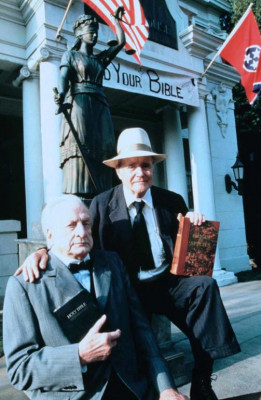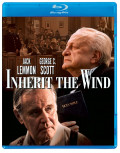| Reviews & Columns |
|
Reviews DVD TV on DVD Blu-ray 4K UHD International DVDs In Theaters Reviews by Studio Video Games Features Collector Series DVDs Easter Egg Database Interviews DVD Talk Radio Feature Articles Columns Anime Talk DVD Savant Horror DVDs The M.O.D. Squad Art House HD Talk Silent DVD
|
DVD Talk Forum |
|
|
| Resources |
|
DVD Price Search Customer Service #'s RCE Info Links |
|
Columns
|
|
|
Inherit the Wind (1999)
Originally made for Showtime, Inherit the Wind (1999), starring Jack Lemmon and George C. Scott, is like watching a touring company staging a Broadway standard that's headlined by a couple of big-name stars. It almost doesn't matter if the production isn't so hot, or whether the actors are a good fit for the characters they're playing. It's enough just to see great talent interpreting familiar characters in a comfy, mostly well-written show.
Originally a 1955 Broadway play by Jerome Lawrence and Robert E. Lee closely based on the 1925 Scopes "Monkey" Trial, but also intended to comment on current anticommunism hysteria and McCarthyism, it starred Paul Muni as the Clarence Darrow-like Drummond, Ed Begley as the William Jennings Bryan-like Brady, and Tony Randall as the H.L. Mencken-like E.K. Hornbeck. Stanley Kramer's famous 1960 film starred Spencer Tracy as Drummond, Frederic March as Brady, and Gene Kelly as Hornbeck. The 1999 TV-film apparently is an adaptation of the 1960 film as much as the play, as it credits that film's screenwriters, the formerly blacklisted Nedrick Young and Harold Jacob Smith, both long dead by 1999.
Directed by Daniel Petrie, the Showtime version is perfectly respectable but not exceptional. In most respects Kramer's film is better, though even that is a couple of notches below greatness. The main attributes of both versions are the leading performances, Tracy's Drummond still towering over everyone else.
The film is, of course, a barely-fictionalized dramatization of the infamous 1925 Scopes "Monkey" Trial, in which Tennessee high school teacher John T. Scopes was convicted of violating state law by teaching his students Charles Darwin's theory of evolution. Presumably for legal reasons (Scopes lived until 1970), Scopes was renamed Bertram Cates (Tom Everett Scott, no relation to George C.), while William Jennings Bryan, representing the prosecution, became Matthew Harrison Brady (George C. Scott); Clarence Darrow, Scopes's attorney, became Henry Drummond (Lemmon); and reporter H.L. Mencken became E.K. Hornbeck (Beau Bridges).
The play and to some extent the movie, despite its 1920s setting, was an attack on ‘50s McCarthyism and laws subverting intellectual discourse generally, as much as it was about evolution vs. creationism. For the 1960 and 1999 film version, minor changes were made that opened up the play a bit while adding more details true to the original Scopes trial (while, conversely, making the Drummond-Brady characters less like their historical counterparts). Oddly, these changes tend to make the film function more like a historical drama rather than underscore its parable aspects. In the 1999 film, the original play's parallels to McCarthyism are not exactly apparent.
The stars are the main draw, though it's hard not to notice their declining health. This was George C. Scott's final film role; he died at 71 four months after this aired. Though he gives the show's best performance, he's noticeably wobbly on his feet and frequently is seen holding onto bannisters and the like when standing. Lemmon, meanwhile, was more than two years older than Scott and reportedly had a lot of trouble remembering his lines; other than a small, uncredited part in The Legend of Bagger Vance (2000), Lemmon would star in just one more TV-film, Tuesdays with Morrie (also 1999), before dying of bladder cancer, in 2001. Further, actor Lane Smith, in the major supporting role of Rev. Brown, was suffering from Lou Gehrig's Disease and clearly unwell.
The project was prompted by the success of an earlier Showtime film, a remake of 12 Angry Men, that likewise starred Lemmon and Scott. Ironically, Scott had recently starred as Drummond in a short-lived 1996 Broadway revival (Charles Durning played Brady in that). Though Scott's performance was almost universally hailed by critics, even at that point Scott was in such poor health he barely got through rehearsals and was forced him to miss many performances, even excusing himself midway through one and walking off. The show closed prematurely. (More irony: Scott's replacement for those performances was Tony Randall, the original Hornbeck back in '55.)
While Scott slips effortlessly into the Brady part, Lemmon doesn't add much beyond his familiar if agreeable screen persona. To his credit, he makes no attempt to emulate Spencer Tracy's interpretation, making the character his own, but it's little more than another notch on his list of credits. (In Tuesdays with Morrie, conversely, Lemmon really stretched, giving one last great performance.)
My recollection of Frederic March in Kramer's film was that he played Brady more floridly, as an arrogant grandstander, single-minded in purpose but without a lot of shading. Scott, on the other hand, unintentionally aided by his weakened physical state, comes off as more vulnerable, more introspective, pompous but a true believer. For all his physical weakness, Scott left on a high note.
Scott's scenes are enhanced by Piper Laurie as Sarah, Brady's devoted wife, who sees Brady's downfall long before he does. Indeed, the film's best scene comes near the end, with the two characters alone in their hotel room. John Cullum is also good as the judge, and Russ Tamblyn is fine in a brief, curious appearance as one of the local leaders of the small southern town. The 1960 film had a bit of stunt casting with lighthearted MGM musicals star Gene Kelly playing the deeply cynical E.K. Hornbeck. Beau Bridges is much less affectatious is the part, but the character has never really worked in any version of Inherit the Wind that I've seen.
Production values are adequate. All the exteriors were clearly shot on the Warner Bros. backlot, except for a brief train station scene shot somewhere else, where incongruous palm trees are visible in the distance. All in all, a handsome, workmanlike production.
Video & Audio
Kino's new Blu-ray of Inherit the Wind, licensed from MGM, looks great. Shot for both 4:3 television and widescreen theatrical issue, it's presented here in 1.78:1 widescreen, with color, sharpness, etc., all essentially flawless. The DTS-HD Master Audio 5.1 mix is a pleasant surprise, full of directional sound effects, much of it directed to the surround channels. Optional English subtitles are provided on this Region "A" disc.
Extra Features
Supplements are limited to a new audio commentary track by entertainment journalists Bryan Reesman and Max Evry.
Parting Thoughts
Not great but definitely worthwhile, this Inherit the Wind is Recommended.
Stuart Galbraith IV is the Kyoto-based film historian largely absent from reviewing these days while he restores a 200-year-old Japanese farmhouse.
|
| Popular Reviews |
| Sponsored Links |
|
|
| Sponsored Links |
|
|
| Release List | Reviews | Shop | Newsletter | Forum | DVD Giveaways | Blu-Ray | Advertise |
|
Copyright 2024 DVDTalk.com All Rights Reserved. Legal Info, Privacy Policy, Terms of Use,
Manage Preferences,
Your Privacy Choices | |||||||














